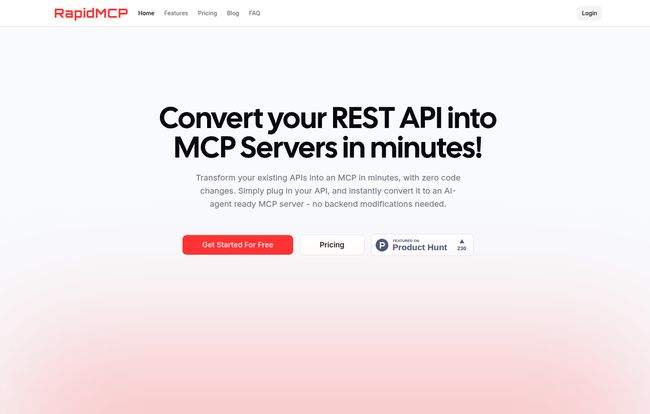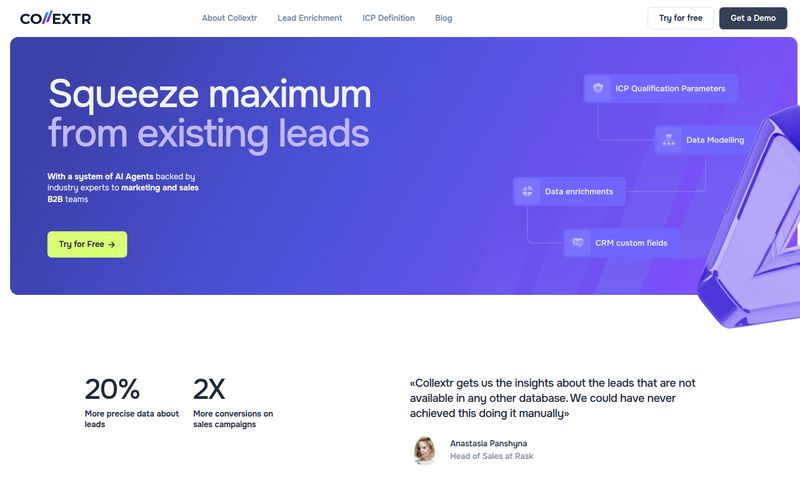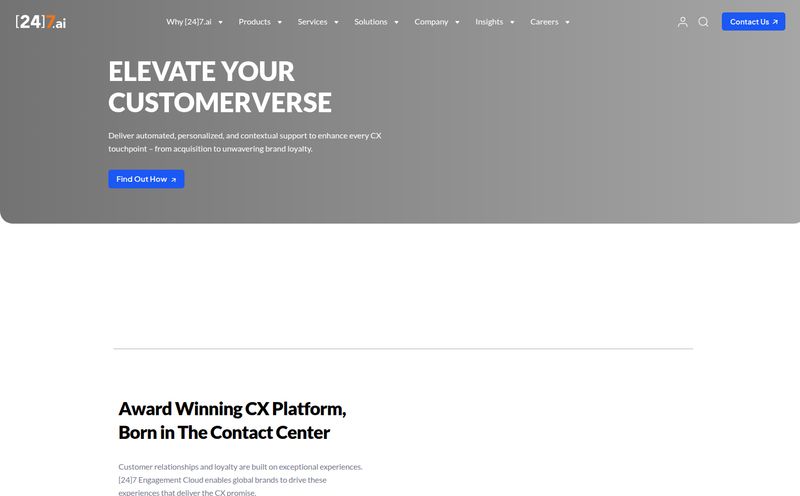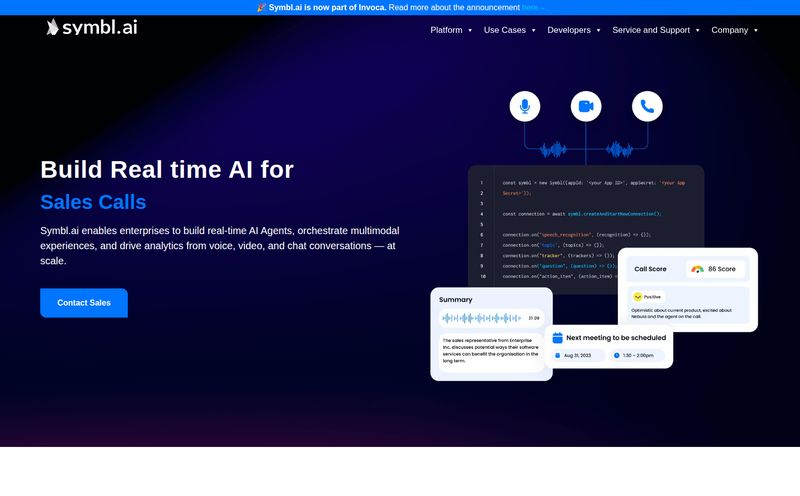The whole AI agent boom is exciting. We're all dreaming of autonomous systems that book our flights, manage our CRMs, and maybe even finally organize our chaotic photo libraries. But for those of us actually building this stuff—the developers, the product people, the SEOs trying to automate workflows—there's a gritty reality. That reality is the API.
Connecting these shiny new AI agents, whether they're built on LangChain, Auto-GPT, or some custom brew, to our existing systems is often a clunky, frustrating mess. You end up writing endless boilerplate, custom parsers, and brittle wrappers just to get the AI to understand what `GET /api/v2/users/{id}` even means. It’s a bottleneck. A real pain in the neck.
So when I stumbled across a tool called RapidMCP, my internal skeptic-o-meter went on high alert. The promise? Convert your REST API into an MCP server—an AI-agent-ready format—in minutes. With. Zero. Code. Changes. Yeah, right. I’ve heard that one before. But, my curiosity got the better of me. I had to see for myself if this was just marketing fluff or the real deal. So here's my honest, no-nonsense look at it.
So, What Exactly is an MCP and Why Should I Care?
Before we go further, let's clear this up. MCP stands for Machine-Composable Protocol. Think of it as a universal language that AIs can understand natively when they want to use a tool (like your API). Instead of you having to painstakingly teach the AI the specifics of every single one of your endpoints, MCP provides a standardized format. It’s like giving your AI a Rosetta Stone for the entire world of APIs.

Visit RapidMCP
And this is where RapidMCP steps in. It’s not an API gateway in the traditional sense. It's more like a hyper-intelligent translator. You point it at your existing, battle-tested REST API. RapidMCP then automatically creates an MCP server that sits in front of it. Your old API doesn’t change at all. It just keeps doing its thing, completely unaware that it’s now fluent in AI-speak. It’s a brilliant, simple concept that solves a genuinely complex problem.
The Core Features That Actually Matter
A features page can be a wall of text, but after playing around, a few things really stood out to me as being genuinely useful for anyone in the trenches.
Instant Transformation is Kind of Magical
This is the main event, and it delivers. The idea that I don't have to touch my backend code is huge. Think about the dev cycles saved. No more pulling a backend engineer off a critical project to build a new interface for the “AI initiative.” You just plug your OpenAPI or Swagger spec into RapidMCP, and... it works. It creates the MCP server. This lowers the barrier to entry for experimentation from a month-long project to an afternoon task. That’s not an incremental improvement; that’s a step-change in how fast you can move.
Seeing Everything with Tool Tracing & Auditing
Here’s something I’ve learned the hard way: when an AI agent does something unexpected, you absolutely must have logs. Trying to debug a non-deterministic system without visibility is a nightmare. RapidMCP's tool tracing gives you detailed logs and even visualizations of every call the agent makes to your API. You can see the inputs, the outputs, and the entire chain of events. For any serious production use case, this isn't a nice-to-have, it's a requirement. The auditing feature adds that extra layer for compliance and security, which will make your security team breathe a little easier.
Playing it Safe with Dev and Prod Environments
This is just good, solid software development practice. Having separate, isolated environments for development and production is critical. You can test new tools or AI prompts in a safe sandbox without any risk of polluting your live data or breaking your production app. It's a sign that the creator understands real-world development workflows, which builds a lot of trust.
The Road Ahead is Paved with Good Intentions
Now, not everything is here yet. A glance at their site shows a handful of powerful features labeled 'Coming Soon'. And honestly, I'm pretty excited about them.
- GraphQL and gRPC Support: While REST is king, many modern tech stacks are built on GraphQL or gRPC. Adding support for these would make RapidMCP a true one-stop-shop for AI integration.
- Self-Hosted Option: This is a big one. For companies with stringent data privacy rules (think finance, healthcare), the ability to host the entire thing within their own VPC is non-negotiable. The fact that this is on the roadmap and even listed in the Pro plan already is a very good sign.
- MCP Resources: The idea of connecting databases directly to AI agents is tantalizing. This could open up a whole new world of possibilities for data analysis and retrieval bots.
It’s always a bit of a gamble with 'Coming Soon' features, but given the practicality of what’s already been built, I’m optimistic.
Let's Talk Money: The RapidMCP Pricing Structure
Okay, the part everyone scrolls down for. The pricing is, thankfully, simple and transparent. No “Contact Us for a Quote” nonsense here. I’ve put it in a simple table to break it down.
| Plan | Price | Key Features | Who It's For |
|---|---|---|---|
| Free | $0 / month | 1 MCP Server, 500 executions/month, Discord access | Hobbyists, solo developers, or anyone who wants to kick the tires and see if it works for their project. |
| Pro | $29 / month | Unlimited MCP Servers, 10k executions/month, Dev/Prod environments, and future access to self-hosting and gRPC/GraphQL. | Growing businesses, startups, and serious developers who need more power and are building production-ready AI applications. |
The free plan is genuinely useful for getting started, and 500 executions is plenty to properly test things out. The Pro plan at $29 feels very reasonable for the value it provides, especially considering the time and development cost it saves. They also offer a 7-day cooling-off period for paid plans, which is a confident move I appreciate.
The Human Element Behind the Tool
I think it's worth mentioning that RapidMCP isn’t some faceless corporate product. It was built by a developer, Ali Salah, who was, in his own words, “frustrated by how difficult it was to connect AI agents to real-world applications.” This is a classic 'scratch your own itch' story, and in my experience, those often lead to the most practical and well-designed tools. It’s born from a real-world need, not a boardroom meeting.
My Final Take: Is RapidMCP Worth Your Time?
So, what’s the verdict? I went in skeptical and came out pleasantly surprised. Yes, some key features are still on the horizon. If you absolutely need a self-hosted GraphQL solution today, this isn't it. But that's not the point.
The point is that RapidMCP tackles a very real, very current problem with an elegant and incredibly simple solution. It removes a major roadblock for developers and businesses looking to leverage AI agents. The speed, the zero-code promise, and the essential observability features make it a compelling tool. For the price of a few fancy coffees a month, you could save yourself days or even weeks of development work. In the fast-moving world of AI, that speed is a competitive advantage.
If you're building with AI agents and tired of the API integration grind, I'd say giving RapidMCP's free plan a spin is a no-brainer. It might just be the missing link you've been looking for.
Frequently Asked Questions
- Do I have to change my existing API code to use RapidMCP?
- Absolutely not. That's the main benefit. RapidMCP works with your existing REST API without requiring any backend modifications.
- What is MCP, again?
- MCP stands for Machine-Composable Protocol. It's a standardized format that makes it easier for AI agents to discover and use tools like your API without custom programming for each one.
- Is there a free trial for the Pro plan?
- The site mentions a free trial is available for all plans, so you can test out the full feature set. Plus, they offer a 7-day money-back guarantee on paid plans if you're not happy.
- What kind of support can I expect?
- Support is founder-led via Discord, chat, and even Zoom. This direct access to the creator is invaluable, especially for an early-stage product.
- Can I host RapidMCP on my own servers?
- A self-hosted option is listed as a feature of the Pro plan and marked as 'Coming Soon' on the main page. This is a high-priority feature for users with strict data security needs.
- Who is RapidMCP really for?
- It's for developers, AI engineers, and product teams who want to connect AI agents to their existing applications quickly and without a major engineering effort. If you're building AI-powered features, this is for you.



